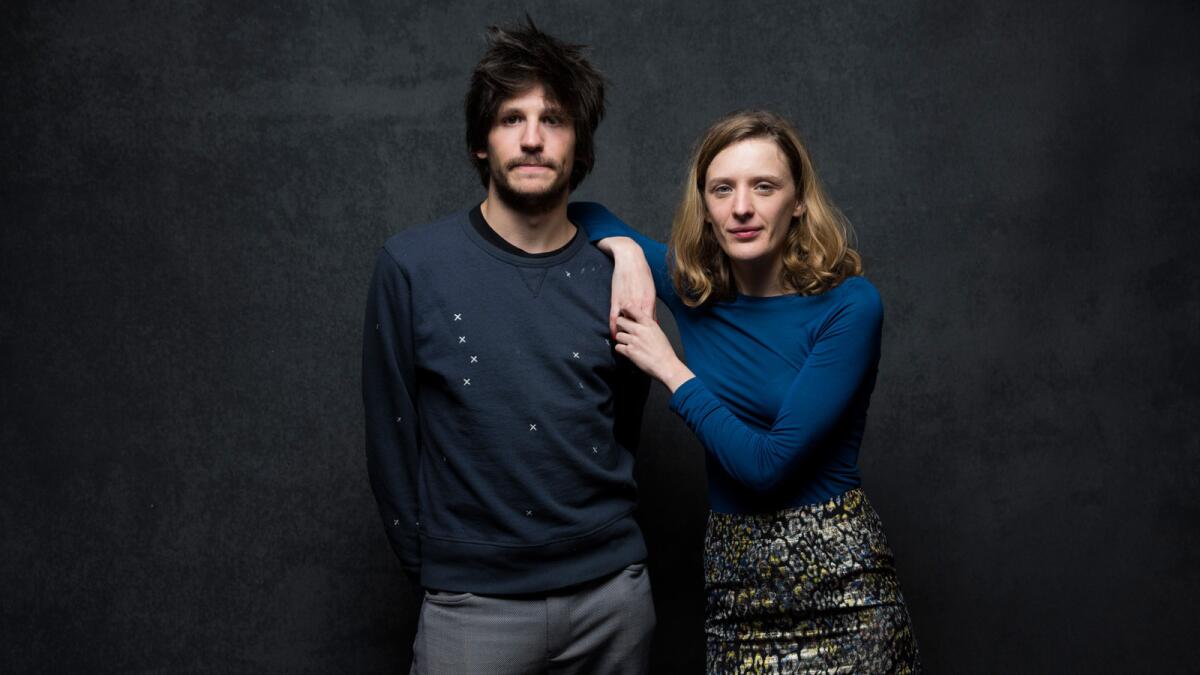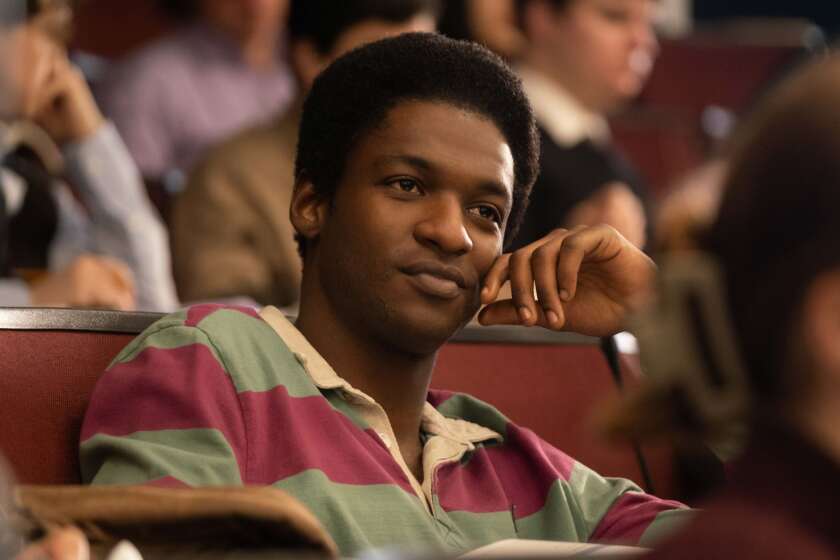Indie Focus: ‘Eden’ spins a poetic tale of France’s early electronic music scene

Actor Felix de Givry and director Mia Hansen-Love of the film “Eden.”
Among the pulsating lights, hypnotic rhythms and seductive movements of a nightclub in full swing, there is often a figure, alone and apart, who keeps it going. The party ends, the dancers go home, but the DJ remains to pack up.
Covering some 20 years in the life of its main character against the backdrop of the developing French electronic music scene, “Eden” is a rare film scaled both big and small, paying close attention to tiny details of emotional development and the larger forces working to shape them.
In the film, now playing in Los Angeles, a young partygoer named Paul (Felix de Givry) becomes half of a DJ duo known as Cheers, riding a wave of parties around Paris and eventually around the world. As years grind by, Paul remains committed to the soulful euphoria of the specific garage house music he spins, even as the crowds start to dwindle. Eventually, as others in his circle have moved on to regular jobs or to start families, Paul has to decide to quit and start fresh at something new.
INDIE FOCUS: Sign up for Mark Olsen’s newsletter about film
Director Mia Hansen-Løve co-wrote the script with her older brother, Sven Hansen-Løve, whose real-life experiences on the electronic music scene form the basis for the film. “It’s kind of mixed up between real things and things that are not so real,” said Sven. “But in the end I don’t think it matters so much; what matters is the feeling we want to express in the film. It’s not me anymore, it’s someone else.”
The collaboration between siblings began with Mia interviewing her brother about his experiences and then creating a structure for them to use. Her previous films, “Father of My Children” and “Goodbye First Love,” won her great acclaim on the international festival circuit for their emotional nuance and likewise had an emotional grounding in real events. Basing a story on her brother’s experiences rather than her own created something at once familiar but different.
“I feel like up until now I’ve always been writing films that are something between fiction and reality, even though for me they are totally fiction,” said Mia, 34.
The ambitious, expanded time frame of the film as well as the scale of some of the parties it depicts is something new for Mia, who is also reaching for something much larger. “Through his path I was trying to capture the spirit of a generation,” she said.
Sven, 41, is studying for a master’s degree in creative writing from Université Paris 8. He sees his time in music as something he had to go through to now find himself as a writer.
“In a way you can say it’s about disillusion, but I don’t think I would say it’s about failure,” he said. “At some point it’s not possible anymore, but I think just to say it’s a failure could be a bit too negative. It’s also positive because it’s a way of learning about yourself, the way the character learns about himself.”
American actress Greta Gerwig, star and co-writer of “Frances Ha” and the upcoming “Mistress America,” has a small but pivotal role as a woman Paul has an affair with in Paris and then reconnects with years later in New York City, where she has moved into more conventional adulthood.
When Gerwig’s character, Julia, leaves Paul behind in Paris, it is conveyed through a quietly devastating scene in which Paul reads a letter she left for him. Gerwig is seen on-screen reciting the letter directly to the camera in a moment at once ephemeral and fleeting, permanent and immutable.
Gerwig had already been a fan of Mia Hansen-Løve’s films when she heard from a mutual acquaintance that the filmmaker had been trying unsuccessfully to reach the actress through official channels. “Which is of course every actor’s nightmare,” she said, “someone genius wants you and they don’t tell you.”
Gerwig met Hansen-Løve in New York and immediately felt fully committed to the project even if the part was for only a few days of work. “I fell very deeply in girl-crush love with her,” said Gerwig. “I was a goner when we were talking. I said I’ll do anything, I just want to be a part of it.”
When introducing the film’s world premiere at the Toronto International Film Festival last fall, Hansen-Løve said, “People who expect to see a biopic of Daft Punk will be very disappointed.”
And yet as it turns out, the Grammy-winning duo does play a crucial role in the film. Starting in the same place as Paul and the Cheers crew, Daft Punk goes on to a parallel career, one marked by a steady rise to the top.
Throughout the film Daft Punk is used in a manner similar to Bob Dylan in the Coen Brothers’ “Inside Llewyn Davis,” a parallel superstar career that remains teasingly out of reach.
In one of the movie’s most uplifting, joyous scenes — and one that Sven Hansen-Løve said is drawn directly from real life — during a packed house party in the scene’s early days, Daft Punk plays for the first time its track “Da Funk,” which would go on to be one of its most enduring songs.
The time frame for the film was shifted slightly so that Daft Punk’s 2013 song “Within,” with the pleading lyric of “please tell me who I am,” could be used in a moving scene near the end of the movie.
“I do think they play a crucial role in the film and they are not decorative,” said Mia Hansen-Løve. “The thing I found beautiful and that I wanted to have in the film is the fact that Paul the character never has any bad feelings about them. On the contrary, even though they are rivals and the ones who succeed, so it could be about jealousy and failure, he still loves their music.”
“They had an idea of what they would be in the future from a very, very early stage. They had a plan,” said Sven Hansen-Løve. “In those days I was just having a good time and enjoying the music and the parties. I wasn’t really planning anything.”
Gerwig recalled the opening sequence of the movie in great detail — “I got movie chills,” she said — leading to a moment of Paul listening to music in an empty club after a night of partying. The delicate modulation of music, performance and emotion created by Mia Hansen-Løve is a form of poetry unto itself.
“I think she’s one of the greats right now,” added Gerwig. “She’s one of the people who are true auteurs making excellent, personal, interesting films with her own cinematic language that she’s developed. There’s a handful of people like that, and she’s one of them.”
Follow me on Twitter at @IndieFocus and subscribe to my Indie Focus film newsletter
------------
‘Eden’
MPAA rating: None
Running time: 2 hours, 11 minutes
Playing at: Landmark Nuart, West Los Angeles
More to Read
Only good movies
Get the Indie Focus newsletter, Mark Olsen's weekly guide to the world of cinema.
You may occasionally receive promotional content from the Los Angeles Times.











